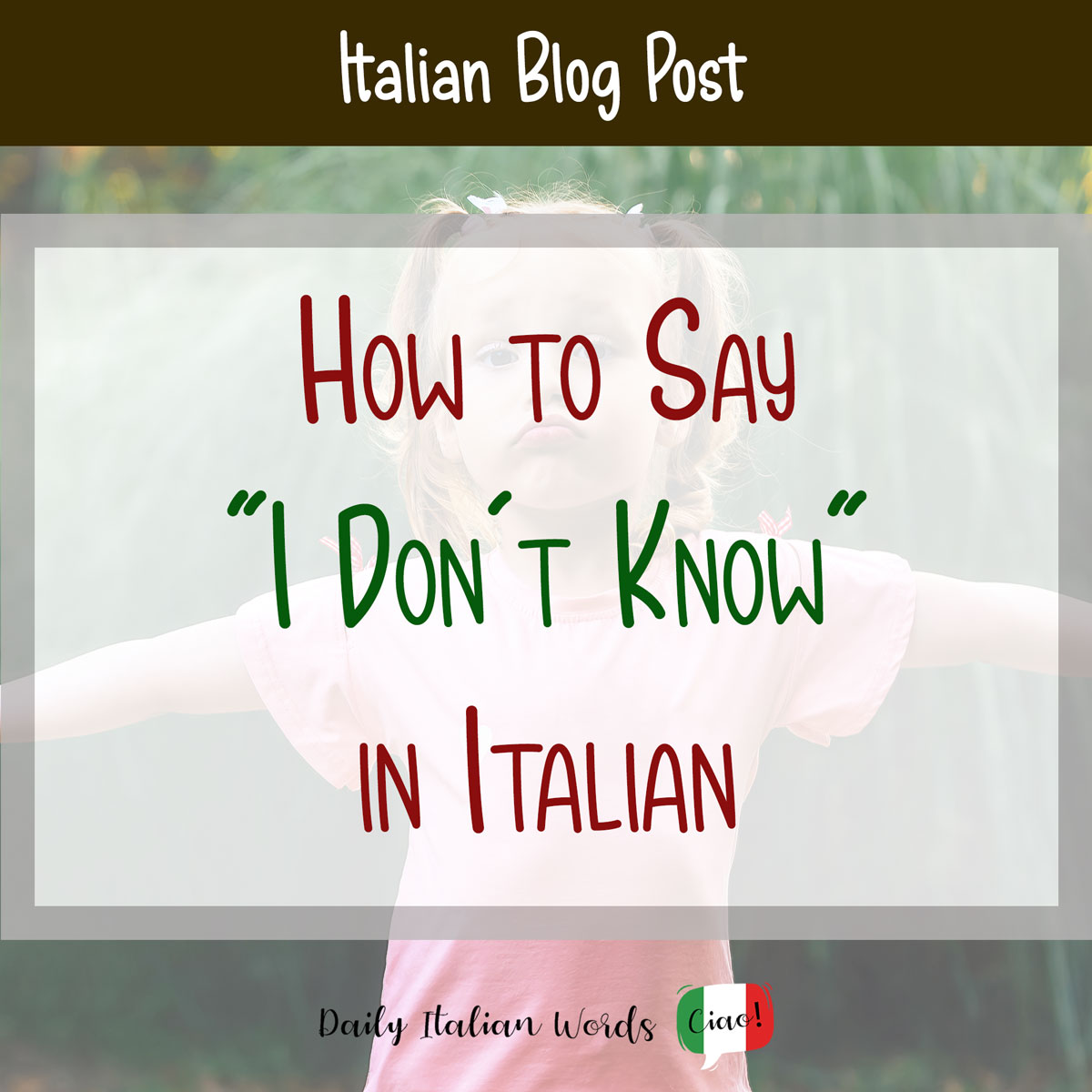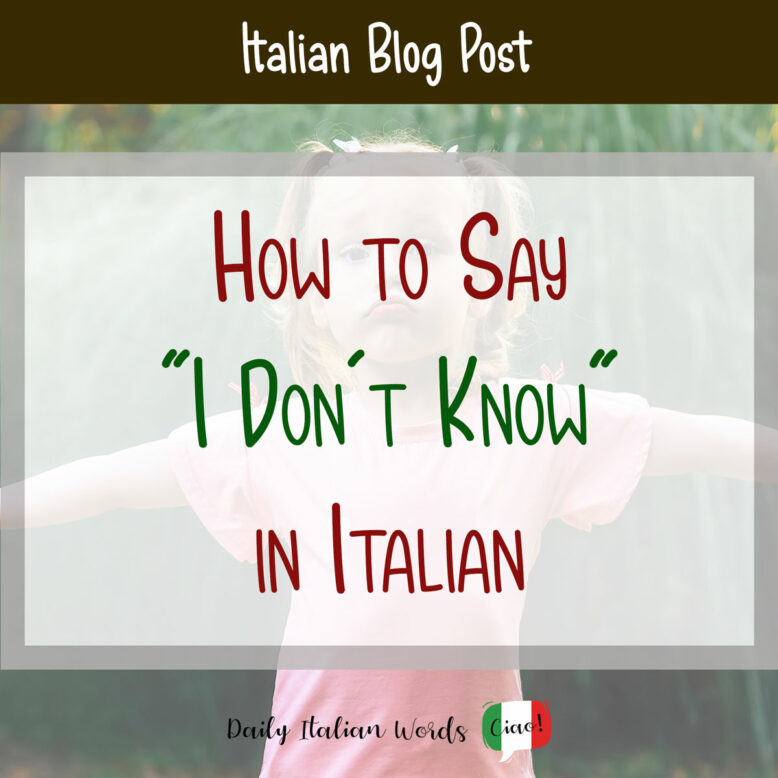
[ad_1]
Understanding tips on how to say “I don’t know” in Italian is an important talent for speaking as a result of it may be a lifesaver in varied conditions. Whether or not you’re a vacationer navigating the streets of Italy, a pupil participating in dialog with native audio system, or knowledgeable in an Italian-speaking atmosphere, understanding tips on how to candidly admit that you simply don’t know one thing is extremely vital.
Furthermore, having the ability to say “I don’t know” isn’t nearly acknowledging a spot in your understanding; it opens the door to additional studying. It invitations others to share their information, serving to you to broaden your grasp of the Italian language and tradition.

How one can say “I don’t know” in Italian
There are 6 key expressions to say “I don’t know” in Italian. As you will note, some could seem fairly comparable, although every has its personal delicate nuance. And in case you can’t memorise all of them, don’t fear – the final expression on this record is particularly easy and really straightforward to recollect.
Non so / Non lo so
(I don’t know)
Let’s begin with the direct Italian translation of “I don’t know”. In Italian we are saying non so or non lo so. The distinction between the 2 is that Non lo so consists of lo, which acts as a placeholder for the particular factor you don’t know, making it extra widespread in response to questions.
As an illustration:
If somebody asks, Che movie vuoi vedere al cinema sabato? (Which film do you need to watch on the cinema on Saturday?), a typical reply might be, Non lo so, c’è troppa scelta! (I don’t know, there’s an excessive amount of selection). On this case, “lo” refers back to the film you may’t determine on.
Then again, in case you say Non so che movie voglio vedere al cinema sabato, c’è troppa scelta! (I don’t know which film I need to see on the cinema on Saturday, there’s an excessive amount of selection!), you’re already specifying what you’re unsure about, so “lo” isn’t wanted.
Each Non so and Non lo so are your go-to phrases for these “I’ve no clue” moments in Italian. They can be utilized in a variety of contexts, becoming into each informal talks and extra critical, formal chats. If you wish to sound extra well mannered, you may add mi dispiace (that means “sorry”)’ on the finish of them.
Listed here are a pair extra examples:
Mi scusi, sa dirmi come posso arrivare in Piazza della Repubblica? – Non lo so, mi dispiace.
Excuse me, are you able to inform me tips on how to get to Piazza della Repubblica? – I don’t know, sorry.
Non so se saremo in grado di soddisfare tutte le richieste dei clienti entro wonderful mese.
I don’t know if we’ll be capable to meet all buyer requests by the top of the month.
Non ne ho thought
(I don’t know)
One other widespread method to say “I don’t know” in Italian is through the use of the expression Non ne ho thought. This phrase is especially helpful whenever you’re requested about one thing particular. It’s extra ceaselessly utilized in casual conditions to point that you simply lack data, a solution, or any clue a couple of particular subject or query.
Listed here are some examples:
Sai a che ora passa il prossimo treno? – Non ne ho thought, prova a chiedere in biglietteria.
Have you learnt when the following practice is coming? – I don’t know, attempt asking on the ticket workplace.
Sai perché Mario è così arrabbiato oggi? – Non ne ho thought, forse ha litigato con Anna.
Have you learnt why Mario is so indignant right now? – I don’t know, possibly he had a combat with Anna.
Non ne ho la minima thought / Non ne ho la più pallida thought
I haven’t obtained the slightest thought
Whenever you need to emphasise a whole lack of awareness or consciousness about one thing, the Italian phrases non ne ho la minima thought or non ne ho la più pallida thought are excellent selections.
Each these expressions are appropriate for varied conditions, each casual and formal. They successfully convey that you’re unsure a couple of explicit subject, don’t know the reply to a query, or can’t present any assist or perception on a selected difficulty.
Listed here are a few examples for example their use:
Cos’è successo tra Anna e Paolo? Non si parlano da due giorni. – Onestamente, non ne ho la più pallida thought.
What occurred between Anna and Paolo? They haven’t talked for 2 days. – Truthfully, I haven’t the faintest thought.
Sai come si accende? – Non ne ho la minima thought.
Have you learnt tips on how to flip this on? – I haven’t obtained a clue.
Che ne so!
How would I do know!
Che ne so is a really relaxed Italian phrase generally used to specific uncertainty or a lack of awareness a couple of subject. It’s usually employed in informal conversations amongst family and friends, when responding to questions. It will possibly additionally seem as Ma che ne so or E che ne so for added emphasis. For instance:
Chi è quel ragazzo che parla con tua sorella? – Ma che ne so!
Who’s that man speaking to your sister? – How would I do know!
Furthermore, che ne so is typically used as a conversational filler in casual dialogues, including an easygoing tone to the dialog. As an illustration:
Quindi, cosa facciamo questo sabato? – Che ne so, potremmo andare a mangiare una pizza.
So, what are we doing this Saturday? – I don’t know, possibly we may seize some pizza.
It’s additionally fairly widespread to position the pronoun io (I) after che ne so for added emphasis, or to insert delicate and robust expletives into the phrase (e.g. che cavolo ne so io = how on earth ought to I do know).
Chi lo sa?!
Who is aware of?!
The expression Chi lo sa! is often utilized in Italian to specific uncertainty in an informal manner. For instance:
Quando finirà questa pioggia? – Chi lo sa!
When will this rain finish? – Who is aware of!
Right here, it signifies that the top of the rain is unpredictable.
In casual contexts, you might also hear Chissà chi lo sa!, which is used for added emphasis. This interprets to Who is aware of who is aware of it! in English, humorously accentuating the uncertainty or the unknowability of a state of affairs. As an illustration:
Gianni, cosa mi hai preso per Natale? – Eh, chissà chi lo sa!
Gianni, what did you get me for Christmas? – Oh, who is aware of!
It is a playful response suggesting the speaker’s want to preserve issues a bit mysterious.
Boh!
Dunno
When studying tips on how to say I don’t know in Italian, boh is probably the most casual expression you’ll come throughout. Now, Italians do like to pair their phrases with expressive gestures, and boh is usually used with a shoulder shrug or by jutting out the chin and flattening the lips, vividly expressing both a lack of awareness or a way of indifference.
Bear in mind, boh could be very informal and is greatest reserved for conversations with family and friends. Listed here are a few examples:
Che ore sono? – Boh, non ho l’orologio.
What time is it? – Dunno, I don’t have a watch.
Cosa regaliamo advert Enrica per il suo compleanno? – Boh, tu hai qualche thought?
What ought to we get Enrica for her birthday? – Dunno, do you’ve gotten any concepts?
Heather Broster is a graduate with honours in linguistics from the College of Western Ontario. She is an aspiring polyglot, proficient in English and Italian, in addition to Japanese, Welsh, and French to various levels of fluency. Initially from Toronto, Heather has resided in varied international locations, notably Italy for a interval of six years. Her main focus lies within the fields of language acquisition, schooling, and bilingual instruction.
[ad_2]